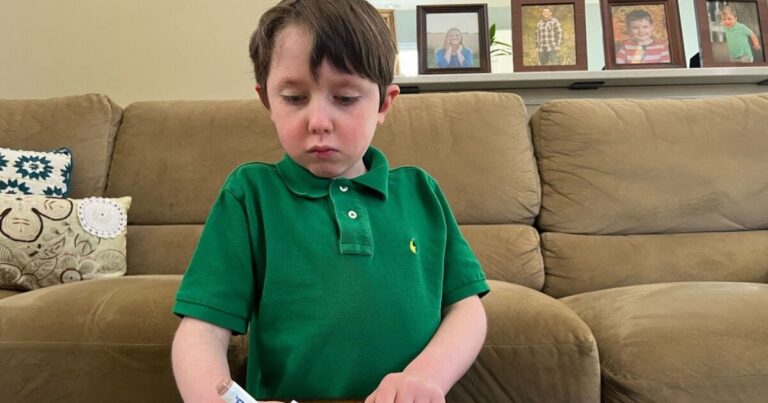Eight-year-old Ryan Petty was having a great day.
He came home early from school, played with his dog at his Chesapeake home and played on the computer before piling into a car to go to the doctor. He sang Trolls Band Together. His seizure medication was working.
Good days are no longer a given for Ryan.
Ten months ago, Ryan began having seizures, so his parents, Christine and Tom, took him to the emergency room, where a neurologist ran genetic tests to find the cause.
When the results came back on Aug. 31, Christine Petty’s life was split in two: before and after doctors diagnosed her son with Niemann-Pick Type C, an extremely rare and terminal disease.
“I’d never heard of it before. I was told it was terminal,” Christine said.
In Niemann-Pick disease type C (NPC), the body is unable to properly absorb or utilize cholesterol. This affects every cell in a person’s body, with a pronounced effect on the brain. It is also known as childhood dementia.
The disease is surprisingly rare, with a 2021 study estimating that fewer than 1 in 1 million people are currently diagnosed with the disease. The earlier the onset of Niemann-Pick disease (NPC), the worse the prognosis. Most people with NPC die between the ages of 10 and 25. A study from the National Institutes of Health called the disease “relentlessly progressive.”
“Over time, you lose your ability to eat, walk, talk and think,” says Christine, who has been researching the disease in depth for the past six months.
The Pettys receive almost all of their care at local medical centers, except for an annual trip to the National Institutes of Health in Bethesda, Maryland, to take part in a long-term study of NPC patients. They also work with the Notre Dame Medical Research Fund to raise funds to find a cure for NPC.
Christine says the medical care Ryan received in Hampton Roads was good, but most doctors there only read about NPC in medical school.
“It can be really hard to find providers who are familiar with the challenges and treatment of NPC,” Christine says.
There are no drugs approved by the Food and Drug Administration for NPC, and because the disease affects each patient’s genes differently, no targeted treatments have been developed.
The Pettys and their doctors submitted a compassionate use application to the FDA for a drug called 2-hydroxypropyl-beta-cyclodextrin, or HP-beta-CD, which in early clinical tests affected cholesterol accumulation.
Patients typically apply for compassionate use when there are no approved treatments for a particular illness and they can show a benefit to lifespan or quality of life. The FDA and the drug company have not yet approved the Pettys’ request.
Meanwhile, Ryan is taking the drug miglustat off-label to help maintain his swallowing function and eye movement control.
Ryan is taking his medication well, Christine said.
NPC is hereditary, meaning Ryan was born with it, but not everyone develops it at the same time or with the same symptoms. Some infants show signs quickly, such as liver failure. Some toddlers are misdiagnosed with ADHD when they start to show neurological symptoms, which is what happened with Ryan.
The Pettys noticed that Ryan was more impulsive and hyperactive than other children when he was 4 years old. He also seemed to have difficulty with physical tasks, like swinging from a bar. These symptoms led to a diagnosis of ADHD. Christine and Tom now know that these behaviors were likely the first signs of NPC.
Until last July, they thought ADHD was Ryan’s biggest challenge.
Since being diagnosed with NPC, his speech has changed. He has vertical supranuclear palsy, meaning he cannot raise his gaze above eye level. He has trouble swallowing and ataxia, meaning he sometimes does not have full muscle control.
“It’s affected every aspect of his life,” Christine said. “He tires more easily and his mobility has decreased.”
Ryan’s fine and gross motor skills have been affected by his illness.
“Sometimes he gets very frustrated when he can’t do something,” Christine said.
When Ryan was diagnosed, Christine put her master’s degree in clinical mental health counseling on hold to take Ryan to speech, swallowing, physical and occupational therapy appointments.
He sees a psychologist once a week.
But as much as he can, Ryan lives like any other eight-year-old boy.
Ryan calls his physical therapy his ninja training. As a reward for improving his mobility, his physical therapist gives him handmade Kung Fu Panda trading cards. Ryan can name all the characters. His favorite is Po.
If he could travel anywhere in the world, Ryan would like to go to Australia to see kangaroos. He plans to get there by boat with the speed of a cheetah.
“I’m going to bring pizza, fruit, gummy bears and a bunch of other stuff and put it all in bags to take to the kangaroos in Australia,” he said.
“He always says, ‘Mom, I think I like being a kid,'” Kristin said.


